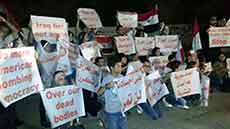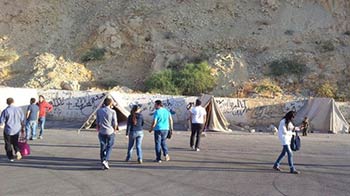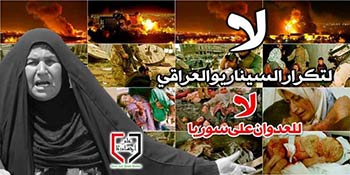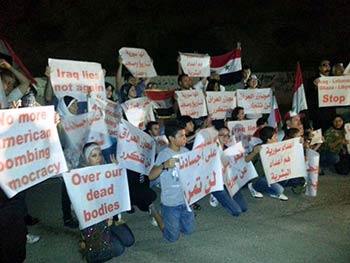
Human Shields Campaign: To Protect Syria from Potential Attack

Ali Abdallah, Syria
A group of Syrians from all walks of life, including young artists and athletes, participated in the campaign called "Over our Dead Bodies" on Monday, to help protect the country from potential foreign military action.
The participants are shielding key facilities in the capital, Damascus, pledging to stand their ground until the US military threats are stopped or they are killed. The organizers of the campaign said they have received calls from all over the world asking for permission to join the movement. The campaign comes as amid threats of foreign military intervention in Syria.

The campaign was launched at Damascus's Sheraton hotel through a press conference, in which Syrian artist Laura abu Asaad, Journalist Ogarit Dandash, and Swimmer Firas Maala took part. The campaign was welcomed by a vast audience, and the number of volunteers increased after a facebook page was established for the campaign.
Ghassan Najjar, the media coordinator of the campaign said "The goal of this campaign is to deliver a message to the world that says: The Syrians will not stand still before the US possible attack to be launched against their country. They will rather stand in face [of this attack] to protect Syria and its facilities with their bare bodies."

In a statement to al-Ahed news, Najjar stated "The initiative started in Qasyoun Mount in Damascus, as it stands symbol to the capital Damascus and to all Syria. Tens of young men, women, and even children gathered in the tents that were set up for the campaign, while more volunteers arrive day after day."
For her part, well-known Lebanese journalist Ogarit Dandash accentuated "Syrian expatriates, also some Arabs [Egyptians, Jordanians, Morrocan] and Westerners from Germany and the US have a strong desire to participate in the campaign, therefore they contact the organizers and ask about how they can support the movement, and what to do to contribute in prevent a military strike."
According to the organizers, some young Syrians who do not belong to any party or political side have already started to execute the idea of human shields in other Syrian provinces. Also, striking it is that the campaign is not funded by any group or party.

The idea of human shields, according to Dandash, is not a similar to protests and rallies. Being a human shield means presenting oneself as armor to protect the civil and military facilities, and risk their safety.
On August 21, terrorist militants and the foreign-backed opposition in Syria claimed that 1,300 people had been killed in a chemical attack the Syrian government launched on militant strongholds in the Damascus suburbs of Ain Tarma, Zamalka and Jobar.
A number of Western countries, including the US, France, and the UK, were quick to adopt the rhetoric of war against Syria despite the fact that Damascus categorically rejected having had any role in the chemical attack.

The Syrian government announced later that the chemical attack had actually been carried out by the militants themselves as a false flag operation.
On August 29, the British parliament voted against participation by Britain, the United States' closest ally, in any potential military intervention in Syria. While the British government had primarily sought a second vote in the parliament as well, it ruled out any such vote on September 2, saying that the parliament "has spoken," and that the government "has absolutely no plans to go back to parliament."
On Friday, August 30, NATO also distanced itself from participating in any military intervention in Syria, with the chief of the Western military coalition, Secretary General Anders Fogh Rasmussen, saying he did not "foresee any NATO role" in a war on Syria.
Syrian armed groups in the Damascus suburb of Ghouta admitted to Associated Press correspondent Dale Gavlak that they were responsible for last week's chemical weapons incident which western powers have blamed on Syrian President Bashar al-Assad's forces.
In a report published on Friday, the armed groups revealed that the casualties were the result of an accident caused by militants mishandling chemical weapons provided to them by Saudi Arabia.
"From numerous interviews with doctors, Ghouta residents, rebel fighters and their families....many believe that certain rebels received chemical weapons via the Saudi intelligence chief, Prince Bandar bin Sultan, and were responsible for carrying out the deadly gas attack," wrote Gavlak.
Despite warnings from the UN, as well as Iran, Russia, and China against war, Washington has remained defiant, saying that it is willing to go ahead with its plans for a strike on Syria without the approval of the United Nations or even the support of its allies. However, US President Barack Obama said on Saturday, August 31 that his administration will first seek authorization from the Congress.
Source: Al-Ahed News



